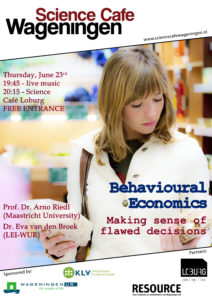June 23rd
Humans have evolved to become decision-making experts. Thousands of years of evolution have fine-tuned our brains to make quick, smart and efficient decisions, essential for our survival. So why do we seem to make irrational choices?
While standard economics assumes that humans are rational beings making optimal decisions, it turns out this is often not the case. Are we faulty decision-making machines? In this Science Cafe session we refer to behavioural economics and consumer studies to explore the process of decision making. How does it work and how can we maybe influence people to make smarter decisions?
Prof. Arno Riedl (Maastricht University) and Dr. Eva van den Broek (WUR) addressed these questions. Simon Vink was our moderator.
Prof. Arno Riedl is professor of public economics at Maastricht University School of Business and Economics and active in the Maastricht University Center of Neuroeconomics. He studied economics at the University of Vienna, and obtained his PhD in economics and social sciences at the same university. He is an expert in behavioural and experimental economics and investigates human decision-making, drawing on insights from ideology, psychology, neuroscience and economics. His research ranges from decision-making under risk and uncertainty (e.g., insurances, pension savings) to the neuronal underpinning of individual and social choices.
Dr. Eva van den Broek is researcher behavioural economics at the agricultural economic institute (LEI, part of Wageningen UR) in Wageningen. She studied Artificial Intelligence at Utrecht University and received a PhD degree in economics and biology at the University of Amsterdam. Her expertise covers economics, consumer sciences and marketing, which she applies in her current research on consumer behaviour. She is also active as a science columnist at sciencepalooza.nl, with psychology, (behavioural) economy, sustainability, and health as tags common to her contributions.

